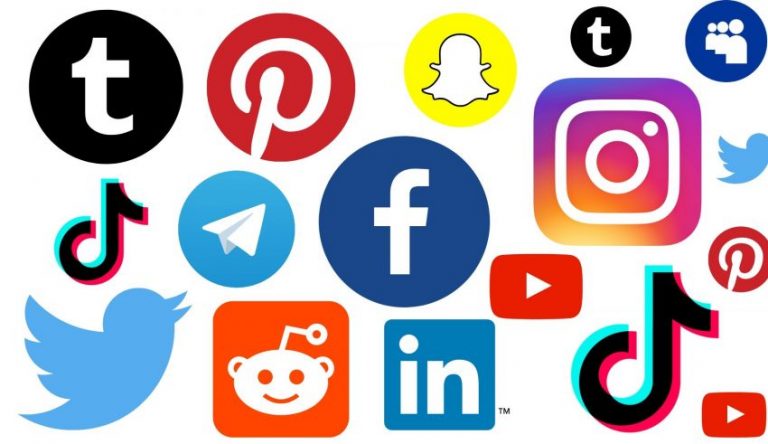Social Media is a means of interaction among people that facilitate the creation/sharing of information, ideas, career interests, insights, and other forms of expression across virtual communities and networks.
Social Media is by far one of the greatest innovations in the past 50 years and, like any invention, can be used for advancement or used for unintended purposes or consequences. For instance, Nuclear Energy can be used to electrify communities, or it can be used to create atomic bombs; books can change your mindset (Think and Grow Rich) or can be read/written to cause harm (Hitler’s Main Kampf or Karl Marx’s Das Kapital). Social Media is a great source of joy, entertainment; we meet most of our friends and even get married through the platforms, business empires have been built, and great ideas exchanged, careers built, hobbies formed and nurtured.
One in six smartphone users say it would make them uncomfortable to miss a day’s updates on social media.
As with any innovation, Social Media is also beginning to mess us up as a generation with rampant division, misinformation, fake news, depression, wasted time online, decreased face-to-face communication, suicides. Lazy thinking, fakeness, narcissism, cyberbullying, to name but a few. As Irish poet and playwright Oscar Wilde once quipped, “Everything in moderation, including moderation.”
“Everything in moderation, including moderation.” – Oscar Wilde
Time Spent on Social Media
We are spending an average of 2 hours 30 minutes on social media daily. We can round it up to 3 hours for time spent on social media, instant messengers, and other online platforms. That means we spend at least 1/8th of our time daily surfing the internet; if you are going to be live for 80 years, that would amount to close to 10 years of your short life spent surfing the internet.
For some of us, our livelihood is directly connected to our use of social media platforms, and for most of us, we have no business spending that much time online, but we do because we think we have loads of time to spend here. As the Buddha noted, “The Trouble is you think you have time.” Our time here on earth is very limited, considering the fact that we would spend close to half of our life sleeping (1/3rd) and the other 1/3rd working.
90% of the data in the world today has been created in the last two years. Everyday, we create 2.5 quintillion bytes of data–so much that 90% of the data in the world today has been created in the last two years alone.
Self-Comparison
We spend our time mindlessly surfing the internet comparing our life with those of others, we stalk, monitor, and wish for other people’s lives all day long, but we forget that it is always greener on the other side. Everyone shares the great side of their lives: Marriage, house, childbirth, cars, vacations, wins, successes, accolades, media mentions, but we hardly share the downside of our existence such as divorce, infertility, loss, layoff, failures, vicissitudes, regrets, worry, vulnerability, etc.
No one has a problem-free life. We all go through challenges and tough times in life, but On Social Media, we pretend, fake it, wing it, put on a mask, create a persona, live a double life, and nurture relationships that are usually not based on strong values.
Mental Health
We human beings are social creatures as we need the support, companionship, relationships, and strength of our communities to thrive during the great and tough times. One of the reasons we are addicted to social media platforms is their promise of helping us build and strengthen our tribe and connection.
The Social Dilemma
The Social Dilemma is a 2020 docudrama directed by Jeff Orlowski and written by Orlowski, Davis Coombe, and Vickie Curtis. Released via Netflix on September 9, 2020, the film explores the rise of social media and the damage it has caused to society, focusing on its exploitation of its users for financial gain through surveillance capitalism and data mining, how its design is meant to nurture an addiction, its use in politics, its impact on mental health (including the mental health of adolescents and rising teen suicide rates), and its role in spreading conspiracy theories and aiding groups such as flat-earthers and white supremacists.
Dr. Anna Lembke; Stanford University School of Medicine (Social Dilemma Netflix Docudrama)
Social Media is a drug; we have a basic biological imperative to connect with other people. That directly affects the release of dopamine in the reward pathway. Millions of years of evolution are behind that system to get us to come together and live in communities, to find mates, to propagate our species. So, there’s no doubt that a vehicle like social media, which optimizes this connection between people, is going to have the potential for addiction.
Jonathan Haidt, Ph.D.; Author, The Righteous Mind
There has been a gigantic increase in depression and anxiety for American teenagers, which began right around 2011 and 2013. The number of teenage girls out of 100,00 in America who were admitted to a hospital every year because they cut themselves or otherwise harmed themselves, that number was pretty stable until around 2010, 2011, and then it begins going way up. It’s up 62% for older teen girls. it’s up 189% for the preteen girls. That’s nearly triple. Even more horrifying, we see the same pattern for suicides: The older teen girls, 15 to 19 years old, they’re up 70% compared to the first decade of this century. The preteen girls, who have very low rates, to begin with, are up 151 %. And that pattern points to social media.
Gen Z, the kids born after 1996 or so, those kids are the first generation in history that got on social media in middle school. How do they spend their time? They come home from school, and they’re on their devices. A whole generation is more fragile, more depressed. They are less comfortable taking risks. The rates at which they get driver’s licenses have been dropping. The number who have ever gone out on a date or had any kind of romantic interaction is dropping rapidly. For every hospital admission, there is a family that is horrified and traumatized.
In his book, Ten Arguments for Deleting Your Social Media Accounts Right Now, author Jaron Lanier makes a strong case for deleting our social media accounts. He noted that our behavior is constantly modified by the social media platform algorithm, which he called The Bummer Machine.
THE BUMMER MACHINE: “Behaviors of Users Modified, and Made into an Empire for Rent”
BUMMER is a machine, a statistical machine that lives in the computing clouds. BUMMER is a machine with six moving parts:
- A is for Attention Acquisition leading to Asshole supremacy
- B is for Butting into everyone’s lives
- C is for Cramming content down people’s throats
- D is for Directing people’s behaviors in the sneakiest way possible
- E is for Earning money from letting the worst assholes secretly screw with everyone else
- F is for Fake mobs and Faker society
“Those who are good at massaging the latest algorithms become stars and earn spectacular salaries.“
Customized feeds become optimized to “engage” each user, often with emotionally potent cues, leading to addiction. People don’t realize how they are being manipulated. The default purpose of manipulation is to get people more and more glued in and to get them to spend more and more time in the system. But other purposes for manipulation are also tested.
The algorithms are rarely interrogated, least of all by external or independent scientists, in part because it’s hard to understand why they work. They improve automatically through feedback. One of the secrets of present-day Silicon Valley is that some people seem to be better than others at getting machine learning schemes to work, and no one understands why. The most mechanistic method of manipulating human behavior turns out to be a surprisingly intuitive art.
BUMMER platform experiences ricochet between two extremes. Either there’s a total shitstorm of assholes or everyone is super careful and artificially nice.
The mass behavior-modification machine is rented out to make money. BUMMER manipulations are not perfect, but they are powerful enough that it becomes suicidal for brands, politicians, and other competitive entities to forgo payments to BUMMER machines. Universal cognitive blackmail ensues, resulting in a rising global spend on BUMMER.
Rise in Narcissism
In their book, The Narcissism Epidemic: Living in the Age of Entitlement Psychology, Professor Dr. Jean Twenge and social psychologist W. Keith Campbell chronicle American culture’s journey from self-admiration to the present-day corrosive narcissism that threatens to infect us all. They also write about our social media addiction is leading to the rise of narcissists.
Social networking sites reinforce narcissism in an endless loop. Narcissists have more “friends” and connections on these sites, and narcissistic behavior and images are rewarded with more comments and more “adds.” Thus users are more likely to be connected with people who are more narcissistic than the average person. So, in addition to the site structure facilitating narcissistic self-promotion, the way users are connected may pull the norm for behavior and self-presentation toward narcissism. If aliens landed on our planet and had to judge the human condition by popular social networking sites, the aliens would think that humans are more narcissistic than they actually are.
“Social networking sites shape the ways teens and twentysomethings view their worlds, and mold the malleable personality of young people like clay. Just as animals evolve and change to fit into their environments, young people are becoming more narcissistic to fit into the demands of the new digital world.“
Digital Minimalism
In his insightful book, Digital Minimalism: Choosing a Focused Life in a Noisy World, author and computer science professor Cal Newport advocates that we focus our online time on a small number of carefully selected and optimized activities that strongly support things you value, and then happily miss out on everything else. He writes:
By working backward from their deep values to their technology choices, digital minimalists transform these innovations from a source of distraction into tools to support a life well-lived. By doing so, they break the spell that has made so many people feel like they’re losing control of their screens.
They tend to be incredibly wary of low-value activities that can clutter up their time and attention and end up hurting more than they help. Minimalists don’t mind missing out on small things; what worries them much more is diminishing the large things they already know for sure make a good life good.
Is this the best way to use technology to support this value? If the answer is no, the minimalist will set to work trying to optimize the tech, or search out a better option.
The idea that it’s valuable to maintain vast numbers of weak-tie social connections is largely an invention of the past decade or so—the detritus of overexuberant network scientists spilling inappropriately into the social sphere. Humans have maintained rich and fulfilling social lives for our entire history without needing the ability to send a few bits of information each month to people we knew briefly during high school. Nothing about your life will notably diminish when you return to this steady-state.
Affecting our Thought-Process
American essayist and critic William Deresiewicz’s essay titled “Solitude and Leadership” shared some great points on how social media is affecting our thinking patterns and thought processes. Deresiewicz said:
Thinking for yourself means finding yourself, finding your own reality. Here’s the other problem with Facebook and Twitter and even The New York Times. When you expose yourself to those things, especially in the constant way that people do now—older people as well as younger people—you are continuously bombarding yourself with a stream of other people’s thoughts. You are marinating yourself in the conventional wisdom. In other people’s reality: for others, not for yourself. You are creating a cacophony in which it is impossible to hear your own voice, whether it’s yourself you’re thinking about or anything else.
Unless you know who you are, how will you figure out what you want to do with the rest of your life? Unless you’re able to listen to yourself, to that quiet voice inside that tells you what you really care about, what you really believe in.
In Irresistible: The Rise of Addictive Technology and the Business of Keeping Us Hooked, Adam Alter, a professor of psychology and marketing at NYU, tracks the rise of behavioral addiction and explains why so many of today’s products are irresistible. He writes:
We obsess over our emails, Instagram likes, and Facebook feeds; we binge on TV episodes and YouTube videos; we work longer hours each year, and we spend an average of three hours each day using our smartphones. Half of us would rather suffer a broken bone than a broken phone, and Millennial kids spend so much time in front of screens that they struggle to interact with real, live humans.
By reverse-engineering behavioral addiction, Alter explains how we can harness addictive products for good—to improve how we communicate with each other, spend and save our money, and set boundaries between work and play—and how we can mitigate their most damaging effects on our well-being and the health and happiness of our children.
Alter propose the following strategies on how we can use technologies to enhance our lives:
- We can’t abandon technology, nor should we. Some technological advances fuel behavioral addiction, but they are also miraculous and life enriching. And with careful engineering they don’t need to be addictive. It’s possible to create a product or experience that is indispensable but not addictive.
- Workplaces, for example, can shut down at six—and with them work email accounts can be disabled between midnight and five the next morning. Games, like books with chapters, can be built with natural stopping points.
- Social media platforms can “demetricate,” removing the numerical feedback that makes them vehicles for damaging social comparison and chronic goal-setting.
- Children can be introduced to screens slowly and with supervision, rather than all at once.
- Our attitude to addictive experiences is largely cultural, and if our culture makes space for work-free, game-free, screen-free downtime, we and our children will find it easier to resist the lure of behavioral addiction. In its place, we’ll communicate with one another directly, rather than through devices, and the glow of these social bonds will leave us richer and happier than the glow of screens ever could.
In conclusion, Social Media is changing our lives in ways we can not imagine, but it is also messing us up. As much as Marriages are being created, it is speeding up divorces, it is giving some of us joy, and it is making most depressed and eventually committing suicide; our post to inspire people is making people envious of our achievements, we are getting engagement and also getting more divisions as a result of fake news, misinformation, bullying, etc.



Comments are closed.